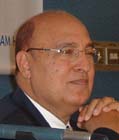Japan's Role in the Middle East Peace Process
Nabil Shaath (Palestinian Authority Minister of Foreign Affairs) and J. Sean Curtin (Fellow, GLOCOM and Asia Times)

Sean Curtin: Japan has indicated that it wishes to make a stronger contribution to the Middle East peace process and is already a major donor in the region. In May of this year, Japan pledged to donate $10 million to the World Bank trust fund for supporting the Palestinian Authority. What concrete steps can Japan take to help the Palestinians and Israelis resolve their conflict?
Nabil Shaath: Structurally, we really wanted Japan to be a member of the quartet [United States, Russia, the European Union and the United Nations]. In fact, we advocated a quintet. But there was resistance from the Americans for including Japan. Not only Japan, but such a move would also open the road for the participation of Norway, a legitimate member of the peace process and maybe several others, who have indicated a desire to take part. I certainly don't believe Japan's inclusion would be a problem, and I think Japan deserves very much to be a member of the quartet. Japan has now been invited to be a member of the task force around the quartet. Japan has also been a founding member of the HLC [High-Level Committee] providing economic support for the Palestinians and the peace process.
Sean Curtin: What non-economic contributions has Japan made?
Nabil Shaath: Japan has contributed significantly to the so called people to people programmes bringing Israelis and Palestinians together for dialogue in Japan.
Sean Curtin: Yes, I believe the most recent confidence-building meeting was held in Tokyo in July of this year. Although the three-day Foreign Ministry sponsored event was not very well publicized, it did make some progress. Both sides were reasonably upbeat at the end. If I recall correctly, former Israeli Finance Minister Dan Meridor, led the Israeli delegation, and Saeb Erakat, Palestinian Minister for Negotiations Affairs, headed the Palestinian delegation.
Nabil Shaath: Yes, that is correct.
Sean Curtin: How would you sum up the general feeling in the Middle East towards Japan?
Nabil Shaath: As Palestinians, we are very much for global Japanese participation and I think the Japanese themselves are very willing to fulfill this role.
The above interview was conducted at Chatham House in London on 18 October 2004
Profile: Nabil Shaath
Nabil Shaath (alternative spelling Sha'ath) is a leading Palestinian figure, who has held a number of high posts in the Palestinian Authority. These have included Palestinian chief negotiator, Palestinian cabinet minister, Palestinian International Co-operation Minister, Planning Minister for the Palestinian National Authority and currently Palestinian Authority Minister of Foreign Affairs.
(Some portions of this interview have also appeared in the Asia Times Online Ltd, http://www.atimes.com, and those sections are reproduce with permission and copy-righted to Asia Times Online.)
Related Articles
Japan to Polish its Tarnished Middle East Image
J. Sean Curtin, Asia Times, 5 May 2004
| 




